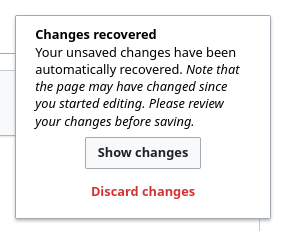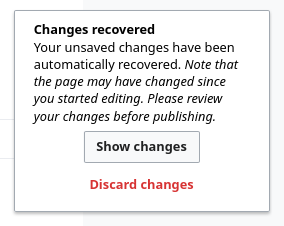Steps to replicate the issue (include links if applicable):
- Open a random page
- Make a edit
- Wait for edit to be saved via EditRecovery
- Close the page without saving
- As a different user (or as the same user in a different browser), open the same page
- Make a edit
- Save page
- As the previous user (or using the original browser) open the same page in edit mode
What happens?:
The text shown to the user is old edit that was saved by EditRecovery. There is no indication that another edit has been made in the ensuing time period, which could lead to the user overwriting their (or a different user's edit)
What should have happened instead?:
There should be some indication that a intermediate edit has occured and the saved edit being applied is from a stale/old revision of the page.
Software version (skip for WMF-hosted wikis like Wikipedia):
Other information (browser name/version, screenshots, etc.):

